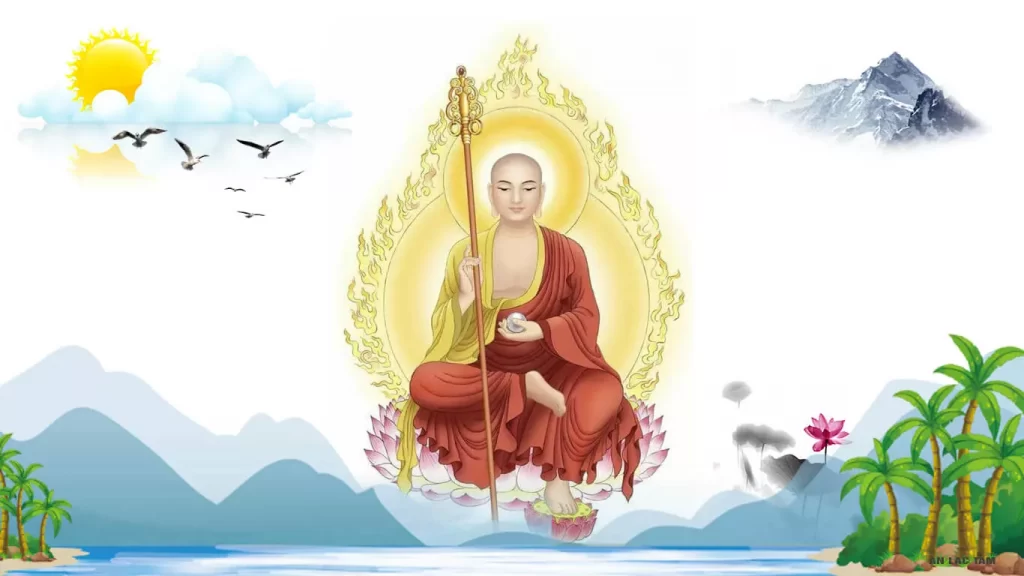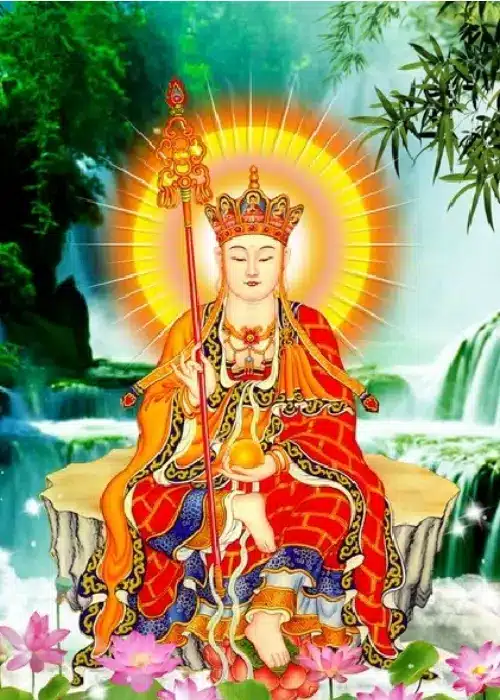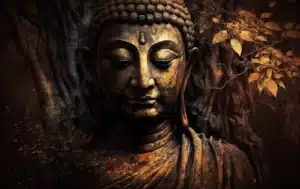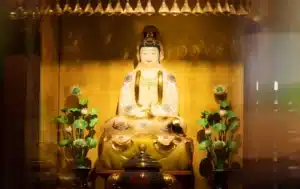The Ksitigarbha Bodhisattva mantra is one of the popular mantras in Mahayana Buddhism, particularly in East Asia, where he is often regarded as the Bodhisattva of hell beings. This is due to his vow to postpone his own Buddhahood until all beings in hell have been liberated.
In Mahayana Buddhism, some adherents believe in the existence of hells and evil spirits, and they may disturb the living. As a result, there are numerous bodhisattvas in Mahayana who are believed to be capable of helping individuals get rid of these unsettling spirits.
If you are troubled by spirits, you can invoke Ksitigarbha Bodhisattva and recite his name multiple times. He is frequently prayed to by those who are poor, sick, depressed, or plagued by nightmares or wandering ghosts.
In Japan, Ksitigarbha is highly venerated, and his statues can be found abundantly, especially in cemeteries and resorts. The Bodhisattva has traditionally been worshiped as the protector of the souls of Mizuko, the souls of miscarried or aborted fetuses. Additionally, firefighters are believed to be under his protection.
Who is Ksitigarbha Bodhisattva?

Ksitigarbha Bodhisattva is an important bodhisattva in Mahayana Buddhism. In Buddhist mythology, Ksitigarbha is revered for his vow to help all beings reach enlightenment, especially those in the hell realms. He is known as the Bodhisattva of the Earth Store, and is often depicted as a monk or a young prince holding a staff and a wish-granting jewel.
“As long as hell is not empty, I vow not to become a Buddha, only after all sentient beings are saved will I myself attain Bodhi.”
Ksitigarbha’s vow is said to be so strong that he is willing to postpone his own Bodhi until all beings in the hell realms have been liberated. According to Buddhist texts, Ksitigarbha descends into the hell realms to help and save suffering beings, and is said to have a special connection with deceased children and women who have had abortions or miscarriages.
Ksitigarbha is also associated with the virtue of patience, as he is said to have waited for eons for the opportunity to make his vow and begin his work in the hell realms. He is venerated for his compassion, diligence, and the power to relieve suffering. In East Asian Buddhism, Ksitigarbha is particularly popular, and his image can often be found in temples, shrines, and homes throughout China, Japan, Korea, and Vietnam.
Symbolic meaning

The shape of Ksitigarbha Bodhisattva is often depicted as a monk or a young prince holding a staff and a wish-granting jewel. He may also be depicted wearing a crown or a halo.
The wish-granting jewel represents Ksitigarbha’s ability to fulfill the wishes of sentient beings. The staff, which is sometimes topped with a sacred pearl, represents his ability to guide beings out of suffering and into enlightenment. The crown or halo symbolizes his attainment of Buddhahood and his spiritual power.
Overall, Ksitigarbha’s shape and symbols represent his compassion, his willingness to help sentient beings, and his vow to relieve the suffering of those in the hell realms.
The Story of Ksitigarbha Bodhisattva
In the Kṣitigarbha Sūtra, it is recounted that Kṣitigarbha, known as Sacred Girl, was once a Brahmin maiden who was deeply troubled by the death of her mother. Despite her mother’s past slander towards the Three Jewels, Sacred Girl sold all her possessions to buy offerings that she presented daily to the Buddha of her time, the Buddha of the Flower of Meditation and Enlightenment. She prayed fervently for her mother to be spared the pains of hell and beseeched the Buddha for help.
One day, while she was praying at the temple, the Buddha instructed her to return home, sit down, and recite his name if she wished to know the whereabouts of her mother. Following his instructions, Sacred Girl’s consciousness was transported to a Hell realm where she met a guardian who informed her that her mother had already ascended to heaven thanks to Sacred Girl’s prayers and offerings. While relieved by this news, Sacred Girl was deeply moved by the suffering she witnessed in Hell. She vowed to relieve beings of their suffering in her future lives for kalpas.
Ksitigarbha Bodhisattva mantra
Mantra long version:
CHHIM BHO CHHIM BHO CHIM CHHIM BHO / AKASHA CHHIM BHO / VAKARA CHHIM BHO / AMAVARA CHHIM BHO / VARA CHHIM BHO / VACHIRA CHHIM BHO / AROGA CHHIM BHO / DHARMA CHHIM BHO / SATEVA CHHIM BHO / SATENI HALA CHHIM BHO / VIVA ROKA SHAVA CHHIM BHO / UVA SHAMA CHHIM BHO / NAYANA CHHIM BHO / PRAJÑA SAMA MONI RATNA CHHIM BHO / KSHANA CHHIM BHO / VISHEMA VARIYA CHHIM BHO / SHASI TALA MAVA CHHIM BHO / VI AH DRASO TAMA HELE / DAM VE YAM VE / CHAKRASE / CHAKRA VASILE / KSHILI PHILE KARAVA / VARA VARITE / MADERE PRARAVE / PARECHARA BHANDHANE / ARADANE / PHAN CHI CHA CHA / HILE MILE AKHATA THAGEKHE / THAGAKHI LO / THHARE THHARE MILE MADHE / NANTE KULE MILE / ANG KU CHITABHE / ARAI GYIRE VARA GYIRE / KUTA SHAMAMALE / TONAGYE TONAGYE / TONAGULE / HURU HURU HURU / KULO STO MILE / MORITO / MIRITA / BHANDHATA / KARA KHAM REM / HURU HURU
Mantra short version:
Oṃ Ha Ha Ha Vismaye Svāhā – Om Ha Ha Ha Win Sam Mo Ti So Ha
Om / Namo Ksitigarbha Bodhisattva
Om Pramardane Svaha
Namo Di Zhang Wang Pu sa
Om Ah Kshiti Garbha Thaleng Hum
Meaning and Benefits of Ksitigarbha Bodhisattva mantra

Ksitigarbha Bodhisattva mantra can be used when someone encounters any difficult problems in life. Chanting this mantra 108 times a day will help neutralize all difficulties and sufferings of a person.
Mantras are also used for clearing karma and removing obstacles in the practice of the esoteric methods of Tibetan Tantrism. In Vietnam, the Ksitigarbha sutra is used for praying for sutras, funerals or weeks of life (Bardo – the 49-day intermediate body phase).
“The practice of chanting or reciting Ksitigarbha mantra is especially beneficial for those who have serious health problems, heavy problems, financial difficulties or are in danger such as natural disasters, earthquakes. ..” – Lama Zopa Rinpoche.
In Japan, Ksitigarbha Bodhisattva is revered as the protector of infants who are stillborn, miscarried or malformed. He is the patron god of travelers, guardian of pregnant women. He helps limit natural disasters in Japan, prolongs lives, and is the guardian of children. Bodhisattvas appear in many forms to alleviate the suffering of the living and the dead here.
Buddha said to Akasagarbha: “Listen, listen attentively! Now, I will tell you about the benefits of reciting Ksitigarbha Bodhisattva mantra, one by one. In the future, any good man or woman who pays homage to Ksitigarbha and listens to this sutra, moreover offers incense, fruit, food… to praise the Bodhisattva, will gain the following benefits”:
- The protection of the deity
- Daily increase in merit
- Not fall behind on the path to enlightenment
- Wealth and abundant clothing and food
- No disease occurs
- No natural disaster, flood, fire
- Don’t be harassed by robbers or thieves
- Admiration and respect of all those encountered
- Supported by Gods and Demons
- Transforming a woman’s body into a man’s body upon reincarnation
- Being the daughter of a royal court if reincarnated as a woman
- Possessing a dignified and graceful figure
- Regular rebirth in heaven
- Sometimes become an emperor or a king
- Possessing magical powers like knowing one’s previous life
- All prayers will be answered
- Happy family members
- Get rid of all unexpected and unpleasant developments
- Permanently erase bad karma
- Always be safe wherever you are
- Always feel safe and happy in your dreams
- Purify bad karma for those who have died
- Get the praises of the Saints
- Possessing a smart mind and a healthy body
- Rich in compassion
- Achieve Enlightenment
Buddhists should recite the Ksitigarbha Bodhisattva mantra at the temple, it will have more meaning. Because in the temple there is dignified, quiet. When we read the Sutra, we can easily pay attention and not be influenced by external circumstances. Thanks to that, the three karmas are pure, the eyes only read the Sutras, the body sits dignified and the thoughts are profoundly meaningful in each sutra. Accordingly, it will bring great merit.
Moreover, when chanting the Ksitigarbha mantra at the temple, if there are places that you don’t understand, there are monks who explain it better. Chanting at home will lack one of the three forms of the Three Jewels, which are monks.
When going to the temple to recite Sutras with monks and many Buddhists reciting the Sutras, the profound meaning of the Ksitigarbha Bodhisattva mantra is echoed throughout, going deep into one’s consciousness, making spiritual strength strong and feeling strong peace and self-understanding of the meaning of the Ksitigarbha Sutra.
In this way, our wisdom becomes more and more clear, the three poisons of greed, hatred, and delusion become thinner and thinner, karma is eliminated more and more, and delusional delusions are reduced and reduced. At that time, Ksitigarbha Bodhisattva will appear, the hell gates of greed, hatred, and delusion will be broken, saving us and all sentient beings from hell.





